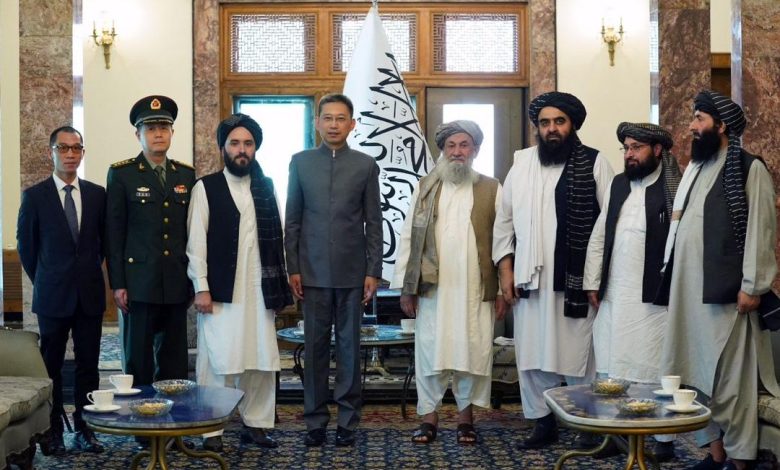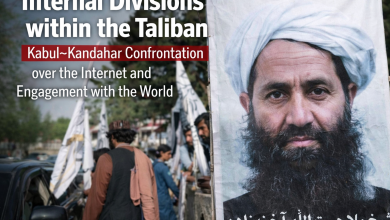Zhao Xing; The new ambassador of the Chinese government presented his credentials to the prime minister of the Taliban government in Kabul, and the Taliban government held an official ceremony with diplomatic formalities to accept the credentials of the new Chinese ambassador.
Afghan News

Zhao Xing; The new ambassador of the Chinese government presented his credentials to the prime minister of the Taliban government in Kabul, and the Taliban government held an official ceremony with diplomatic formalities to accept the credentials of the new Chinese ambassador.
During the two years of the re-rule of the Taliban in Afghanistan, this action of the Chinese government and the reciprocal behavior of the Taliban government is unprecedented. This is while the government of the Islamic Republic of Iran and the government of Pakistan appointed their new ambassadors in Kabul without credentials and without formal diplomatic formalities from the Taliban government.
Considering the background as well as the strong diplomatic relations between China and the Taliban government, the presence of the new Chinese ambassador with this type of diplomatic formality, which is common only among official governments, is considered by the Taliban government and some analysts as an attempt by the Chinese government to implicitly recognize the Taliban government. , has been interpreted. Apart from the perception and interpretation of the Taliban government, it is certain that this type of action by China is completely a “meaningful action”. Because China’s foreign policy apparatus is fully aware that this type of action is against international practice and custom.
Nevertheless, the initiative of the Chinese government in appointing an ambassador by submitting an official letter of credence can send a meaningful signal to the Taliban government and other countries involved in Afghanistan’s affairs. The clear message of this Chinese behavior to the Taliban government, the region and the world is that Beijing has the power to “initiate action” regarding the situation in Afghanistan and the future fate of the Taliban government. This kind of power and “boldness of action” undoubtedly makes China’s position in Afghanistan unique and decisive.
These unprecedented actions of China in establishing official diplomatic relations with the Taliban government have a bilateral nature. On the one hand, this action is against the custom and practice of international law. The dominant rule in international relations is that recognizing or laying the groundwork for recognizing a new government is not inherently a legal matter, but rather a political behavior that countries only act on based on their political interests.
Therefore, no law or international institution can obligate any country to recognize or not recognize a new government. Nevertheless, China’s attempt to recognize the Taliban government may cause discontent among some countries, especially Western countries.
The current US policy is to prevent the recognition of the Taliban government. It remains to be seen what approach other countries in the region will adopt in this regard. The Moscow format meeting about Afghanistan is coming up and there will probably be discussions in this regard.
Undoubtedly, this Chinese action will significantly increase Beijing’s influence in Afghanistan’s economic and political arena. Most likely, with this kind of actions, China may have more influence on the political behavior of the Taliban.
Some experts believe that the Taliban government can withstand pressure and this has been proven during the two years of this group’s rule. Therefore, the recommendation of these experts is that regional and extra-regional countries, through interaction, demand reforms in Taliban governance, including women’s rights and the formation of an inclusive government.
The question that is raised in this regard is what will be the reaction of the American government to the expansion of China’s influence in Afghanistan? The answer to this question is related to the analysts’ reading of the US strategy regarding China’s influence in Afghanistan.
According to the general reading, the US government has a negative reaction to the expansion of China’s influence in Afghanistan, and this type of mutual behavior between China and the Taliban government may cause the Taliban-US relations to deteriorate.
But in a rare reading, the US indirectly tends to drag the foot of the Chinese government further into the Afghan territory, to the extent that it unintentionally becomes completely involved in the Afghan crisis. Probably, the American government has a lot of game tools in its hands for more influence and trapping China in Afghanistan.
In the meantime, the Taliban government is of the opinion that, like the government of Pakistan, it should establish balanced relations with the American and Chinese governments at the same time and use the competition between these two rivals to its advantage, but the fact is that the Taliban does not have this diplomatic capacity. .
From another point of view, China’s bold action in appointing an ambassador with official ceremonies in Kabul also has diplomatic consequences for the countries of the region. If the countries of the region do not pass this red carpet in appointing and changing their ambassadors in Afghanistan, their behavior and political relations with the Taliban government will have different messages and consequences.




